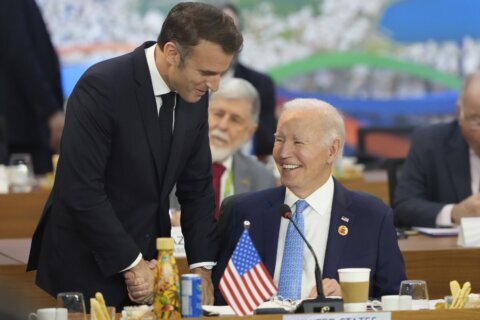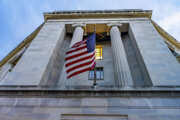BEIJING (AP) — Chinese authorities are chasing unpaid taxes from companies and individuals dating back decades, as the government moves to plug massive budget shortfalls and address a mounting debt crisis.
More than a dozen listed Chinese companies say they were slapped with millions of dollars in back taxes in a renewed effort to fix local finances that have been wrecked by a downturn in the property market that hit sales of land leases, a main source of revenues.
Policies issued after a recent planning meeting of top Communist Party officials called for expanding local tax resources and said localities should expand their “tax management authority and improve their debt management.”
Local government debt is estimated at up to $11 trillion, including what’s owed by local government financing entities that are “off balance sheet,” or not included in official estimates. More than 300 reforms the party has outlined include promises to better monitor and manage local debt, one of the biggest risks in China’s financial system.
That will be easier said than done, and experts question how thoroughly the party will follow through on its pledges to improve the tax regime and better balance control of government revenues.
“They are not grappling with existing local debt problems, nor the constraints on fiscal capacity,” said Logan Wright of the Rhodium Group, an independent research firm. “Changing central and local revenue sharing and expenditure responsibilities is notable but they have promised this before.”
The scramble to collect long overdue taxes shows the urgency of the problems.
Chinese food and beverage conglomerate VV Food & Beverage reported in June it was hit with an 85 million yuan ($12 million) bill for taxes dating back as far as 30 years ago. Zangge Mining, based in western China, said it got two bills totaling 668 million RMB ($92 million) for taxes dating to 20 years earlier.
Local governments have long been squeezed for cash since the central government controls most tax revenue, allotting a limited amount to local governments that pay about 80% of expenditures such as salaries, social services and investments in infrastructure like roads and schools.
Pressures have been building as the economy slowed and costs piled up from “zero-COVID” policies during the pandemic.
Economists have long warned the situation is unsustainable, saying China must beef up tax collection to balance budgets in the long run.
Under leader Xi Jinping, the government has cut personal income, corporate income, and value-added taxes to curry support, boost economic growth and encourage investment — often in ways that favored the rich, tax scholars say. According to most estimates, only about 5% of Chinese pay personal income taxes, far lower than in many other countries. Government statistics show it accounts for just under 9% of total tax revenues, and China has no comprehensive nationwide property tax.
Finance Minister Li Fo’an told the official Xinhua News Agency that the latest reforms will give local governments more resources and more power over tax collection, adjusting the share of taxes they keep.
“The central government doesn’t have a lot of responsibility for spending, so it doesn’t feel the pain of cutting taxes,” said Cui Wei, a professor of Chinese and international tax policy at the University of British Columbia.
The effectiveness of the reforms will depend on how they’re implemented, said Cui, who is skeptical that authorities will carry out a proposal to increase central government spending. That “will require increasing central government staffing, and that’s an ‘organizational’ matter, not a simple spending matter,” he said.
“I wouldn’t hold my breath,” Cui said.
Sudden new tax bills have hit some businesses hard, further damaging already shaky business confidence. Ningbo Bohui Chemical Technology, in Zhejiang on China’s eastern coast, suspended most of its production after the local tax bureau demanded 500 million yuan ($69 million) in back taxes on certain chemicals. It is laying off staff and cutting pay to cope.
Experts say the arbitrary way taxes are collected, with periods of leniency followed by sudden crackdowns, is counterproductive, discouraging companies from investing or hiring precisely when they need to.
“When business owners are feeling insecure, how can there be more private investment growth in China?” said Chen Zhiwu, a finance professor at the University of Hong Kong’s business school. “An economic slowdown is inevitable.”
The State Taxation Administration has denied launching a nationwide crackdown, which might imply past enforcement was lax. Tax authorities have “always been strict about preventing and investigating illegal taxation and fee collection,” the administration said in a statement last month.
As local governments struggle to make ends meet, some are setting up joint operation centers run by local tax offices and police to chase back taxes. The AP found such centers have opened in at least 23 provinces since 2019.
Both individuals and companies are being targeted. Dozens of singers, actors, and internet celebrities were fined millions of dollars for avoiding taxes in the past few years, according to a review of government notices.
Internet livestreaming celebrity Huang Wei, better known by her pseudonym, Weiya, was fined 1.3 billion yuan ($210 million) for tax evasion in 2021. She apologized and escaped prosecution by paying up, but her social media accounts were suspended, crippling her business.
The hunt for revenue isn’t limited to taxes. In the past few years, local authorities have drawn criticism for slapping large fines on drivers and street vendors, similar to how cities like Chicago or San Francisco earn millions from parking tickets. Despite pledges by top leaders to eliminate fines as a form of revenue collection, the practice continues, with city residents complaining that Shanghai police use drones and traffic cameras to catch drivers using their mobile phones at red lights.
Outside experts and Chinese government advisors agree that structural imbalances between local and central governments must be addressed. But under Xi, China’s most authoritarian leader in decades, decision-making has grown more opaque, keeping businesses and analysts guessing, while vested interests have pushed back against major changes.
“They have a hermetically sealed process that makes it difficult for people on the outside to know what is going on,” says Martin Chorzempa, senior fellow at the Peterson Institute for International Economics.
Beijing has been reluctant to rescue struggling local governments, wary it might leave them dependent on bailouts. So, the central government has stepped in only in dire cases, otherwise leaving local governments to resolve debt issues on their own.
“In Chinese, we have a saying: You help people in desperate need, but you don’t help the poor,” said Tang Yao, an economist at Peking University. “You don’t want them to rely on soft money.”
Economists say intervention may be required this time around and that the central government has leeway to take on more debt, with a debt-to-GDP ratio of only around 25%. That’s much lower than many other major economies.
Accumulated total non-financial debt, meanwhile, is estimated at nearly triple the size of the economy, according to the National Institution for Finance and Development and still growing.
“This is a huge structural problem that needs a huge structural solution that is not forthcoming,” said Logan Wright of the Rhodium Group, an independent research firm. “There’s really no way around this. And it’s getting worse, not better.”
___
Fu Ting reported from Washington.
Copyright © 2024 The Associated Press. All rights reserved. This material may not be published, broadcast, written or redistributed.







